|
|
|
Sort Order |
|
|
|
Items / Page
|
|
|
|
|
|
|
| Srl | Item |
| 1 |
ID:
076505


|
|
|
|
|
| Summary/Abstract |
Do the institutions and practices of the major powers influence those of other states? Many international relations theorists have argued that these powerful states' prestige allows them to define what is normatively acceptable. This paper tests the influence of the internal characteristics of major powers on democratization, the extension of formal political equality to women, and the practice of jailing or killing the state's domestic political opponents. We find support for the major power prestige hypothesis in the latter two cases. In understanding some important international outcomes, it makes sense to treat major powers less like impenetrable "billiard balls," distinguished only by their relative power, and more like "snowflakes" with many relevant internal characteristics
|
|
|
|
|
|
|
|
|
|
|
|
|
|
|
|
| 2 |
ID:
099104
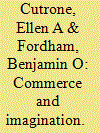

|
|
|
|
|
| Publication |
2010.
|
| Summary/Abstract |
Do members of Congress put human rights concerns on the agenda in response to their constituents' demands for trade protection? Humanitarian concern may be an important motive, but the normative weight of these issues also makes them a potentially powerful tool for politicians with less elevated agendas. They may criticize the behavior of countries with whom their constituents must compete economically, while overlooking the actions of countries with which their constituents have more harmonious economic relations. This paper tests several hypotheses about the salience of human rights concerns in the politics of US foreign policy using data on congressional speeches during the late 1990s gathered from the Congressional Record. We find evidence that, while humanitarian interests remain an important motive for raising human rights issues, the economic interests of their constituents influence which members of Congress speak out on these questions, and the countries on which they focus their concern.
|
|
|
|
|
|
|
|
|
|
|
|
|
|
|
|
| 3 |
ID:
123629
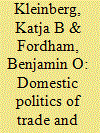

|
|
|
|
|
| Publication |
2013.
|
| Summary/Abstract |
Liberal international relations theory suggests that mutual gains from trade prevent conflict between states. Previous research has focused predominately on international outcomes, especially the occurrence of militarized conflict between pairs of states. How concerns about welfare gains from trade help produce the policy choices leading to these outcomes is less well understood. This paper examines the influence of economic interests arising from international trade on the policy-making process at the domestic level. If the benefits of trade increase the opportunity cost of conflict, then support for a harmonious foreign policy should be strongest among trade's domestic beneficiaries. Those whose income is diminished by trade have no reason to favor a friendly foreign policy and might even prefer a hostile alternative. We test whether the domestic distributional effects of trade affect support for hostile foreign policies toward China among representatives in the US Congress. An analysis of cosponsorship and roll-call voting suggests that the export orientation and import sensitivity of their districts influences members' positions on measures that criticize Chinese policies or treat the country as a security threat.
|
|
|
|
|
|
|
|
|
|
|
|
|
|
|
|
| 4 |
ID:
165170
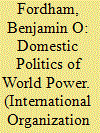

|
|
|
|
|
| Summary/Abstract |
The United States' 1890–91 decision to begin building a battleship fleet, an important point in its development as a world power, can illuminate the domestic sources of foreign policy ambition. An analysis of roll-call votes in the House of Representatives indicates that socioeconomic divisions arising from industrialization strongly influenced support and opposition to the battleship fleet. This relationship worked mainly through trade policy interests: members of Congress from import-competing states tended to support the effort, while those from export-oriented states tended to oppose it. The patriotic symbolism of battleships at a time of labor unrest also helped motivate support for the program, though evidence of this pattern is less conclusive. Although party affiliation was crucial, it was also partly a function of economic structure, which shaped the two parties’ electoral fortunes. The impact of trade interests during this period is a mirror image of what previous research has found concerning the post-World War II era, when export-oriented interests tended to support American global activism and import-competing interests to oppose it. The reason for the difference is the Republican Party's commitment to trade protection, which strongly influenced both the goals of the policy and the identity of its supporters.
|
|
|
|
|
|
|
|
|
|
|
|
|
|
|
|
| 5 |
ID:
160774
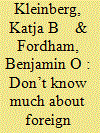

|
|
|
|
|
| Summary/Abstract |
Public opinion surveys on American foreign policy often elicit many “don’t know” or “no opinion” responses. Researchers have paid surprisingly little attention to these responses, typically dropping them from their analyses or suppressing them in the survey design. We argue that these practices lead to potentially misleading conclusions about both the level of support for particular foreign policies and the determinants of individual attitudes. We demonstrate these problems using an original survey experiment testing the effect of including a DKNO option on three common questions about international trade, the use of force, and isolationism. Our findings also suggest that taking DKNO responses more seriously in our analyses provides a richer sense of the process through which important covariates actually influence attitudes.
|
|
|
|
|
|
|
|
|
|
|
|
|
|
|
|
| 6 |
ID:
083746
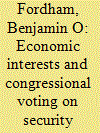

|
|
|
|
|
| Publication |
2008.
|
| Summary/Abstract |
Most research on congressional consideration of foreign and defense policy concludes that ideology is the most important influence on roll-call voting and that constituent economic interests are not very important. This article challenges this conclusion on two grounds. First, most previous research conceives of constituent economic interests on these issues very narrowly, examining only the benefits constituents obtain from providing military goods and services rather than their economic stakes in the broader goals of national security policy. Second, the effect of ideology on congressional voting has changed enormously over time, a fact that poses difficulties for research that has stressed this consideration. The effects of broader economic interests and the changing implications of ideology are tested using a sample of key Senate votes on military resource allocation, intervention, and foreign aid from 1947 through 2000.
|
|
|
|
|
|
|
|
|
|
|
|
|
|
|
|
| 7 |
ID:
109579
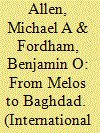

|
|
|
|
|
| Publication |
2011.
|
| Summary/Abstract |
Most bargaining models of war suggest that the absence of ex-ante uncertainty about the outcome of fighting should lead to negotiated outcomes rather than military conflict. Nevertheless, relatively weak states still refuse demands from dominant powers in many cases. This paper tests several explanations for this phenomenon. James Fearon's account of rationalist explanations for war suggests two reasons states might resist militarized demands even if there is little or no chance of military victory. First, the weaker state might not concede if the stronger state's threat is not credible. Second, guerrilla resistance to enemy occupation might create a commitment problem for the stronger state if it could impose costs that exceed the value of the stronger state's objectives. Alternative explanations that do not assume the state behaves as a unitary rational actor focus on special features of state preferences, such as the importance attached to political sovereignty and territorial integrity, or on the difficulties state institutions might pose for making the policy changes necessary to concede the more powerful state's demands. Empirical analyses of MID and ICB data point to the importance of both rationalist claims about threat credibility and alternative arguments about state preferences.
|
|
|
|
|
|
|
|
|
|
|
|
|
|
|
|
| 8 |
ID:
150486
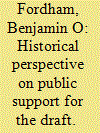

|
|
|
|
|
| Summary/Abstract |
The military draft was once an important element of American national security policy with widespread popular backing. The collapse in public support for it is an important historical puzzle. Public opinion about the draft also offers an arena for assessing the role of war costs, such as military casualties, in shaping attitudes toward national security policy. The costs of the draft fall on a readily identifiable segment of the population. However, surveys administered during several different historical periods provide only limited evidence that these costs affect individual opinion. Draft eligibility reduced support for conscription during peacetime but not during major wars, when the cost of being drafted was greatest. By contrast, military service had a more consistent socializing effect, with veterans and their families expressing greater support for the draft. Together, these and other individual-level processes suggest a possible explanation for the decline in aggregate support for conscription that has more to do with changing force structure and elite leadership than with public aversion to the costs of war. The results also suggest that war costs have more complicated effects on public opinion than most research on public support for war implies.
|
|
|
|
|
|
|
|
|
|
|
|
|
|
|
|
| 9 |
ID:
112460
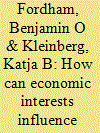

|
|
|
|
|
| Publication |
2012.
|
| Summary/Abstract |
Recent research on the sources of individual attitudes toward trade policy comes to very different conclusions about the role of economic self-interest. The skeptical view suggests that long-standing symbolic predispositions and sociotropic perceptions shape trade policy opinions more than one's own material well-being. We believe this conclusion is premature for two reasons. First, the practice of using one attitude to predict another raises questions about direction of causation that cannot be answered with the data at hand. This problem is most obvious when questions about the expected impact of trade are used to predict opinions about trade policy. Second, the understanding of self-interest employed in most studies of trade policy attitudes is unrealistically narrow. In reality, the close relationship between individual economic interests and the interests of the groups in which individuals are embedded creates indirect pathways through which one's position in the economy can shape individual trade policy preferences. We use the data employed by Mansfield and Mutz to support our argument that a more complete account of trade attitude formation is needed and that in such an account economic interests may yet play an important role.
|
|
|
|
|
|
|
|
|
|
|
|
|
|
|
|
| 10 |
ID:
057594


|
|
|
| 11 |
ID:
106268
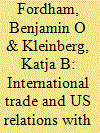

|
|
|
|
|
| Publication |
2011.
|
| Summary/Abstract |
US relations with China are critically important for the future of world politics. They are also a useful case in which to test the individual-level implications of the liberal commercial peace argument. A plausible case can be made on both sides of the claim that China poses a security threat to the United States. China's economy is growing far faster than the United States' economy, while the country remains a communist autocracy. At the same time, trade between the United States and China has expanded dramatically in the last three decades. Its dual role as a major trading partner and a growing international rival generates substantial uncertainty about China's future status as friend or foe. Using data from a recent survey by the Chicago Council on Foreign Relations, we find that economic interests help explain individual Americans' assessment of China as a threat and their views concerning hostile policies toward that country. Those who stand to benefit from trade with China hold more positive views of the country and oppose conflictual foreign policies with respect to it. Those whose incomes are likely to decline because of trade with China tend to take the opposite position on these questions.
|
|
|
|
|
|
|
|
|
|
|
|
|
|
|
|
| 12 |
ID:
085306
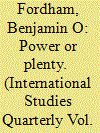

|
|
|
|
|
| Publication |
2008.
|
| Summary/Abstract |
This paper evaluates the effect of economic interests and security concerns on American intervention in civil and international conflict. Generalizations about the relative importance of these considerations have played critical role in the historiography of American foreign relations. Although statistical analysis is well suited for evaluating such generalizations, quantitative researchers have devoted relatively little attention to the issue. Existing large-n research has generally found that security concerns matter more, but has not considered how the economic and security concerns thought to affect intervention might also influence each other. These subsidiary relationships complicate efforts to assess the relative importance of these two influences on intervention. Evidence concerning intervention in international crises and civil wars indicates that, while alliance commitments and rival behavior have a greater immediate impact on American intervention, exports have an important indirect effect by shaping alliance commitments in the long run.
|
|
|
|
|
|
|
|
|
|
|
|
|
|
|
|
| 13 |
ID:
077453
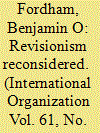

|
|
|
|
|
| Publication |
2007.
|
| Summary/Abstract |
Why did the United States intervene in World War I, breaking with its long tradition of noninvolvement in European political and military conflicts? During the 1920s and 1930s, many "revisionist" historians argued that American efforts to protect its trade with the Allies ultimately led to intervention. The logic of the revisionist position closely parallels the contemporary liberal case that interdependence promotes peace but arrives at different conclusions about the relationship between trade and conflict. Historians have largely abandoned this economic interpretation of American intervention, but data on the impact of the wartime export boom on the United States suggest that it should be reconsidered. The export boom was so large that it would have been difficult to ignore, and its progress corresponds to the timing of important decisions leading to American belligerency. An analysis of congressional voting on war-related measures also suggests that export income helped shape politicians' views of the war
|
|
|
|
|
|
|
|
|
|
|
|
|
|
|
|
| 14 |
ID:
158691
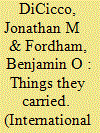

|
|
|
|
|
| Summary/Abstract |
Do foreign policy elites who shared formative political experiences also share similar views on subsequent policy issues? Proponents of a generation effect suggest that they do, but this argument overlooks two facts: (1) not everyone experiences major historical events in the same way and (2) different experiences might give rise to quite different policy views. Here we investigate the impact of the Vietnam War on elite opinion about foreign policy during the following two decades using elite surveys conducted by the Foreign Policy Leadership Project (FPLP) from 1976 through 1996, assessing their susceptibility to what has been called the Vietnam Syndrome. Not surprisingly, we find that age and military service influenced elite opinion about the Vietnam War. More importantly, we find that different trajectories of opinion about the Vietnam War influenced later views about a wide range of foreign policy issues during the Cold War, even after controlling for party identification and ideology. However, we see little evidence that these effects persisted after the end of the Cold War. This finding holds even on matters like civil war intervention, for which we might expect the experience of the Vietnam War to remain relevant. Our analysis suggests that the Vietnam Syndrome is restricted to matters involving Cold War rivalry.
|
|
|
|
|
|
|
|
|
|
|
|
|
|
|
|
| 15 |
ID:
175340
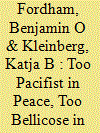

|
|
|
|
|
| Summary/Abstract |
Scholars of public opinion and foreign policy recognize that the general public is poorly informed about international affairs, but they disagree about whether and how this fact affects the policies that it will support. Some argue that the lack of information has little effect, at least in the aggregate, while others hold that political information mediates attention to elite cues. We investigate a third line of argument in which political information has a direct effect on the policy options individuals support. Low levels of political information give rise to a pattern of complacency toward likely international threats in times of relative peace and a contrasting tendency to support violent and aggressive policy options during war or acute crises. We test this argument using survey data from two relevant historical settings: the American entry into World War II and the response to the 9/11 terrorist attacks.
|
|
|
|
|
|
|
|
|
|
|
|
|
|
|
|
| 16 |
ID:
101687
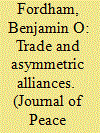

|
|
|
|
|
| Publication |
2010.
|
| Summary/Abstract |
Alliances are usually understood as a way for states to aggregate military capabilities in the face of a common threat. From this perspective, the willingness of relatively powerful states to form alliances with much weaker partners is puzzling. The weaker ally often adds little to the stronger state's security and may increase its chance of military entanglement. This article presents evidence that international trade helps explain these alliances. States that have the power to do so have incentives to protect their trading relationships against interference from either third states or internal conflict. Alliances are one means of providing this protection. This argument differs from most other research on trade and alliances, which reverses the causal arrow and suggests instead that alliances increase trade. Empirical analysis indicates that trade increases the probability of alliance formation in major power-minor power dyads and decreases the chance that alliances will dissolve. These results are robust to a variety of changes in the specification of the model and the data used for estimation. They also do not stem from any influence of alliance relationships on trade. An analysis of the effect of alliance formation on change in the level of bilateral trade turns up no evidence that the formation of an alliance increases commerce.
|
|
|
|
|
|
|
|
|
|
|
|
|
|
|
|
| 17 |
ID:
100283
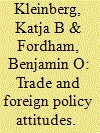

|
|
|
|
|
| Publication |
2010.
|
| Summary/Abstract |
Does trade influence whether individuals view other states as friendly or threatening? Liberal theory implies that it should, but the individual-level implications of the liberal argument are rarely tested. Trade should influence individual attitudes more strongly where trade is more economically important. International trade also creates both winners and losers within the trading states, and the foreign policy attitudes of these winners and losers should differ. The authors test hypotheses drawn from this line of argument using a forty-seven-country survey conducted by the Pew Global Attitudes project. They find some evidence that exports but not imports reduce hostile foreign policy attitudes. They find little support for the claim that the trade interests indicated by factor ownership influence attitudes toward trading partners in this broad cross-national sample. On the other hand, attitudes toward trade and foreign direct investment are correlated with broader foreign policy attitudes in the way liberal theory suggests. The authors conclude that there is reason to believe that trade influences individual foreign policy attitudes but that factor ownership does not provide an adequate account of individual interests in international trade in most cases.
|
|
|
|
|
|
|
|
|
|
|
|
|
|
|
|
| 18 |
ID:
107654
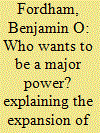

|
|
|
|
|
| Publication |
2011.
|
| Summary/Abstract |
Some states define their interests more broadly than others, looking beyond their immediate security and mobilizing their national wealth in pursuit of more ambitious goals. The most successful of these states come to be seen by others as major powers. Though major powers and states aspiring to attain this status are very important in world politics, relatively little explicit attention has been paid to the question of why some states expand their foreign policy ambitions, adopting what can be termed a major-power foreign policy. This article evaluates three explanations for this policy choice. Some international relations theory claims that potential power is itself a sufficient motivation for the adoption of major-power foreign policy. Other theorists suggest that some triggering condition is required, such as increasing international threat or expanding international economic interests. Evidence concerning the construction of military capabilities and diplomatic activism indicates that potential power alone does not offer a sufficient explanation for the adoption of major-power foreign policy. Both international threats and economic interests act as triggers for this choice, though they appear to push states toward different types of mobilization.
|
|
|
|
|
|
|
|
|
|
|
|
|
|
|
|
|
|
|
|
|